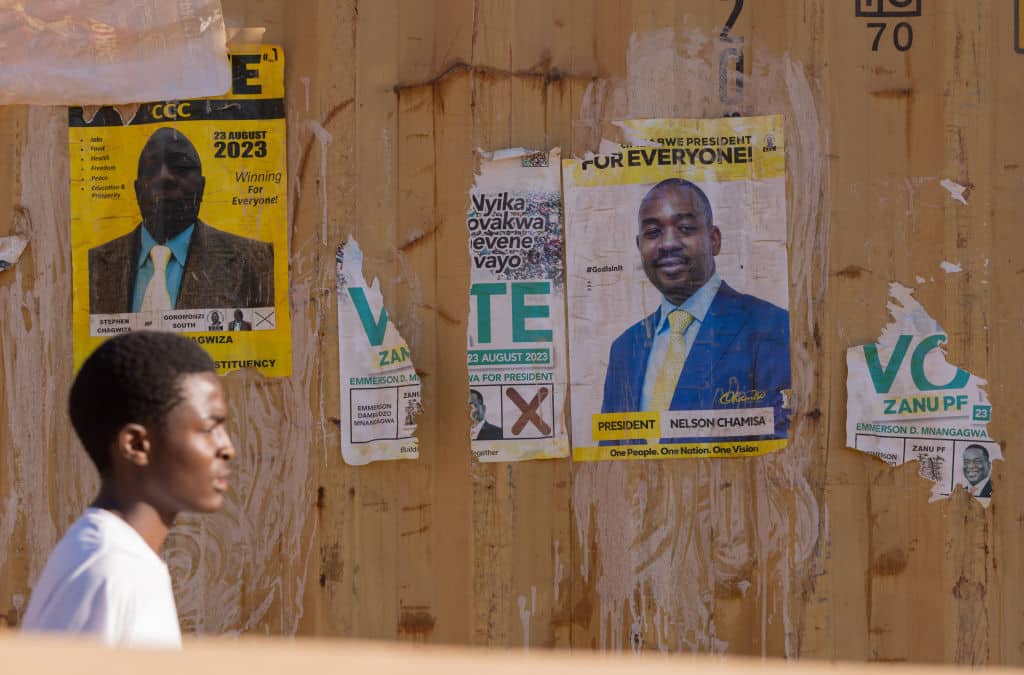Zimbabwe’s recent national election, resulting in a narrow win for the incumbent ZANU-PF party and President Emmerson Mnangagwa, is facing challenges amid allegations of fraud and irregularities by the leading opposition party, the Citizens’ Coalition for Change. International observers highlight concerns over transparency and fair practices, while Zimbabwe’s history of economic decline and political turmoil looms large.
Zimbabwe’s hotly-contested national election, which ended in a narrow victory by the incumbent ZANU-PF party and President Emmerson Mnangagwa, is set to be challenged by the leading opposition party, the Citizens Coalition for Change (CCC), with the CCC’s leader declaring the election a “gigantic fraud”. The voting process has been critiqued by both local and international observers and has borne allegations of voting irregularities and intimidation by the ruling party and affiliated groups.
The voting, which began on Wednesday, August 23, was extended by a day due to the non-delivery of ballots in many polling stations, including those in the capital of Harare and Bulawayo. This saw some voters queuing for over 24 hours to cast their ballots.
Issues around the timely delivery and sealing of ballots, excessive delays in procedure, as well as allegations of gerrymandering, were all noted as concerns by South African Development Community (SADC) observers, who issued their preliminary report on the election over the weekend, noting that it “fell short of the requirements of the Constitution of Zimbabwe, the Electoral Act, and the SADC Principles and Guidelines Governing Democratic Elections (2021).”
“Zimbabwe was never a democracy, and it is still not a democracy,” tweeted prominent Zimbabwean journalist Hopewell Chin’ono. “That means it would be foolish for anyone of us to have expected a Free, Fair, and Credible election from ZANUPF.”
Similar concerns to those of SADC were noted by both European Union (EU) and Commonwealth observers, who also cited stakeholder concerns of voter intimidation and irregularities in the handling of ballots by the Zimbabwean Electoral Commission (ZEC). Observers did, however, note that the election process was largely peaceful, in stark contrast to the 2018 general election.
Local civil society organizations known to conduct independent oversight on the voting, such as the Zimbabwe Election Support Network (ZESN) and Election Resource Centre (ERC), who deploy observers and issue projections regarding the voting, saw their offices raided by government security forces as the vote counting was being concluded. Their staff was arrested and all equipment seized, contributing to a climate of uncertainty and intimidation surrounding the election and leading to further criticism by international bodies.
The United States Agency for International Development (USAID) condemned the arrests, calling for the immediate release of all persons detained and stating, “This is a worrying development for human rights in Zimbabwe, and it undermines democracy and respect for human rights,” in a statement last week.
The United Nations Secretary-General also expressed concerns through a spokesperson in a statement late yesterday: “The Secretary-General is closely following developments in Zimbabwe’s elections. He is concerned about the arrest of observers, reports of voter intimidation, threats of violence, harassment, and coercion.”
The primary opposition party, the CCC, has rejected the results, with party leader Nelson Chamisa stating, “There’s going to be a change in Zimbabwe, whether ZANU-PF people want it or not… we will not wait for five years, there has to be a change now,” he said in a media briefing yesterday.
ZANU-PF has held the reins of power since the end of white-minority rule in the country since 1980, initially under the long reign of Robert Mugabe, who was ousted in a coup in 2017. Then Vice-President Mnangagwa ascended to the Presidency with the support of the Zimbabwean Defense force and its commander, Constantino Chiwenga.
Mnangagwa’s regime has been reportedly marred by authoritarianism and corruption scandals, with a recent Al-Jazeera documentary implicating the President and many of his political associates in smuggling and money laundering. This is in a country ranked as one of the poorest in the world, according to World Bank data.
Under Mugabe’s rule and the controversial land reform policies of the early 2000s, the country saw a steep economic decline, hyperinflation, and increasing international sanctions. The continued instability in the country has led to many professionals leaving for better pastures, particularly that of neighboring South Africa.
The CCC’s Chamisa has indicated that the party will challenge the election results in court.
President Mnangagwa, after securing his second term, celebrated his victory and commended what he termed the transparency of the process, stating that the lack of violence was a sign of the country’s maturing democracy, and that some “…observation missions went beyond their call of duty…” and that “… those who feel the race was not run properly, know where to go.”
